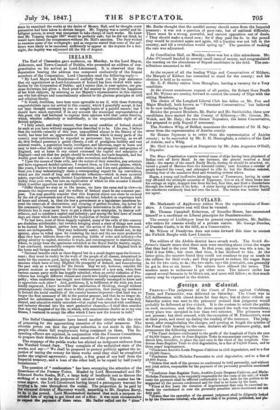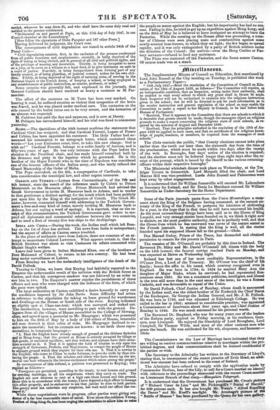fforeign. ant 42!Colonial.
Fast:cu.—The judgment of the Court of Peers against Cnbibree, Teats, and Parmentier, was delivered on Saturday. The Court was in full deliberation with closed doors for four days; but at three o'clock on Saturday notice was sent to the prisoners' counsel that judgment would probably 'be delivered at five o'clock. It is the custom to admit the public on such occasions, and when the doors opened the rush was tremendous, every place was occupied in less than two minutes. The prisoners were not present; but their counsel, with the exception of M. Parmentier's, were at their posts, and stood up during the reading of the sentence. The judg- ment, after recapitulating the charges' and quoting at length the articles of the Penal Code bearing on the case, declares all the prisoners guilty, and pronounces the following sentence-
" The Court declares confiscated to the profit of the hospitals of Paris the smn of 94,000 franca, given to Jean-Baptiste Tests to consummate corruption. Con- demns him, therefore, to place the said sum in the chest of the hospitals. Con- demns Jean-Baptiste Tests to civil degradation, to a fine of 94,000 francs, and to three years' imprisonment.
"Condemns Amedee-Louis Despans-Cubieres to civil degradation, and to a fiLle of 10,000 francs. "Condemns Marie-Nicholas Parmentier to civil degradation, and to a fine of 10,000 francs.
"Orders that each of the persons so condemned be held personally, and without
anyjoint action, responsible for the payment of the pecuniary mentioned above. "Condemns Jean-Baptiste Teste,Amidee-Louis Deepens- Cnbires, and Mane- Nicholas Parmentier, to be conjointly responsible for the costa of the suit; of which costs the payment shall be eted conformably to law, both for the portion to be supported by the persons condemned and for that to be borne by the state. 'Fixes at five years the duration of imprisonment that may be exercised to- wards the condemned in case the pecuniary penalties above-mentioned are not
duly paid. "Orders that the execution of the present judgment shall be diligently looked
to by the Procureur-General; who shall see that it be printed, published, and pls.
carded, wherever he may deem fit, and who shall have the same duly read and notified to the persons condemned. "Deliberated on and passed at Paris, on this 17th day of July 1847, in our Council-chamber at the Luxembourg.' [Here follow the signatures of Duke Pasquier and 187 other Peers.] Having delivered its judgment, the Court rose. The consequences of civil degradation are stated in article 34th of the Penal Code-
" Civil degradation consists, first, in the exclusion of the persons condemned from all public functions and employments; secondly, in being deprived of the right of voting or being elected, and in general of all civil and political rights, and of the privilege of wearing any decoration. Thirdly, in being incapable to serve on a jury, or to serve as a witness to a legal deed, or to give testimony on oath in a court of justice. Fourthly, in being incapacitated from forming part of any family council, or of being guardian, or judicial counsel, unless for his own chil- dren. Fifthly, in being deprived of the right of carrying arms, of serving in the National Girard or the French Army, of keeping a school, or being employed in any establishment of public instruction, as master, professor, or usher."
Some surprise was generally felt, and expressed in the journals, that General Cubieres should have received as heavy a sentence as M. Par- mender.
The effect of the sentence on M. Teste has been very marked. On hearing it read, he suffered emotion so violent that congestion of the brain was feared, and be was placed under medical care. The contusion on the ride caused by the bullet turns out to be very severe, and the formation of an abscess was expected.
M. Cubieres has paid the fine and expenses, and is now at liberty.
M. Pellapra has surrendered himself, and his trial was fixed to commence yesterday.
Rome.—The Quotidian° of the 10th instant confirms the statement that Cardinal Gizzi has resigned; and that Cardinal Ferretti, Legate of Pesaro and Urbino, has been appointed his successor. The Holy Father had an- nounced his nomination in an autograph letter, which contained these words—" Let your Eminence come, then, to take this new charge: God is with us!" Cardinal Ferretti, belongs to a noble family of Ancona, and is fifty-two years of age. He was very intimate with the Pope before his election to the Pontifical chair, and has made himself remarked both by his firmness and piety in the legation which he governed. He is the brother of the Major Ferretti who in the time of Napoleon was considered one of the bravest officers of the Italian army, and who lately refused the Grand Mastership of the Order of Malta.
The Pope convoked, on the 8th, a congregation of Cardinals, to take into consideration the municipal law, and other urgent measures.
GREECE AND Tunacy.—Letters from Constantinople, of the 7th and 8th instant, state the result of the reference made by Coletti to Prince Metternich on the Mussurus affair. Prince Metternich had advised the Greek Government to invite M. Mussurus back to Athens, and to tender to that gentleman a distinct apology for the insult which had been publicly put upon him by the King at the instigation of Coletti. The Greek Mi- nister, however, contented himself with addressing to the Turkish Govern- ment a free-and-easy kind of letter, merely inviting M. Mussurus back to Athens, but not saying a word of apology. It is reported, that on the re- ceipt of this communication, the Turkish Government gave orders to sus- pend all diplomatic and commercial relations between the two countries, and to send a fleet of twenty-five war-ships to the Archipelago.
Tama AND Casaa.—During the week, the Indian mail which left Bom- bay on the 1st of June has arrived. The news from India is unimportant; but the aspect of affairs at Canton seems troubled.
In the place of authentic news from Lahore, there are rumours of an at- tempt to assassinate Colonel Lawrence. What appears certain is, that the British Resident was about to visit Cashmere on affairs connected with Gholab Singh's welfare.
Leave had been given to Sultan Mahomed Khan, one of the brothers of Dost Mahomed of Cabool, to return to his own country. He had been long under surveillance at Lahore. From Bombay we have the melancholy intelligence of the death of Sir David Pollock.
Turning to China, we learn that Keying had faithfully reported to the Emperor the unfavourable result of the collision with the British forces at Canton, and that his courageous candour was not followed by an order to saw him in two. The Emperor's answer enjoins the punishment of those officers and men who were charged with the defences of the forts, of which the guns were spiked. The local authorities at Canton exhibited a desire honestly to carry out the conditions imposed by Sir John Davis. Some difficulty had arisen in reference to the stipulation for taking on lease ground for warehouses and dwellings on the Ronan or South side of the river. Keying indicated an eligible spot at Chan-tan-tsui; which was surveyed and staked out. The landholders, however, were unwilling to part with the ground. De- legates from all the villages of Ronan assembled in the College of Shwang- chan, and agreed upon a memorial to Mr. Macgregor; which was presented to him on the 20th of May by a body of 150 elders of Ronan, venerable old men dressed in their robes of state. Mr. Macgregor declined to re- salve the memorial; but its contents are known: it set forth these repre- sentations, in temperate language- " 1. That the English have already enough of ground at the thirteen factories and in Hong-kong; that the ground at Henan is entirely occupied for tillage or fish-ponds, or ancestral sacrifices; and that widows and orphans have their annu- ities secured on it. 2. That it is against the faith of treaties to rely upon the strength of Governors, Prefects, and Magistrates, to compel the people of Ronan to alienate ground which they require for their own use. 3. That it is unwise in the English, who come to China to make fortunes, to provoke strife by thus irri- tating the people. 4. That the scholars and elders who have drawn up the me- morial can bear witness to the intense excitement which exists among the people." In consequence of this refusal, a petition was presented to Keying; who replied as follows-
" Foreigners are permitted, according to the treaty, to rent houses and ground for erecting buildings, in all the emporiums where they carry on trade. The English are now desirous to rent at a high rate those houses and this ground. Since this is in accordance with the treaty,! have deputed a high officer to manage this affair properly, and to endeavour to see that justice be done to both parties. The gentry need not entertain any suspicion, but wait until our officer has ma- naged it."
While these negotiations were in progress, other parties were giving evi- dence of a far less reasonable state of mind. Ever since the collision Yenng, Prefect of Sing-hang-fu, has been urging the authorities to allow him to raiae
the people en masse against the English; but his importunity has had no suc- cess. Failing in this, he tried to get up an expedition against Hong-kong; and on the 20th of May he is believed to have instigated an attempt to burn the Factories. While the meeting on the Honan affair was proceeding, a num- ber of Chinese were seen placing mats and combustibles against some newly-erected boat-houses, to which they set light; the fire began to spread rapidly, and it was only extinguished by a party of British soldiers under the direction of the Consul: the natives--even the Hong Coolies or Fac- tory servants—refused to lend any assistance.
The Pluto was stationed off the Factories, and the Scout nearer Canton. Of course trade was at a stand.



























 Previous page
Previous page